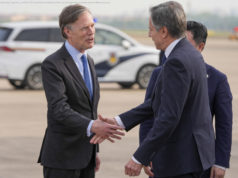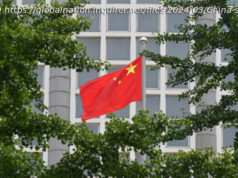A Q&A with former Australian Prime Minister Kevin Rudd, who is going to school on the Chinese president.
Mao Zedong once insisted that “the people, and the people alone, are the motive force in the making of world history.” Then again, he’s also the guy who said that poverty is good, a world war is nothing to fuss about, and that reading books can be a bad thing. In other words, take him with a large grain of MSG.
One person who seems to be doing exactly that is Xi Xinping, the president — and now, likely president for life — of Mao’s China. This week, his puppet Communist Party Central Committee looked poised to abolish the 10-year term limit on his job, which is a strong hint that Xi thinks the individual can be a pretty effective motive force on history all by his lonesome. And if you want to disagree, he has a remorseless “anticorruption” task force to persuade you otherwise.
So, what does the enthronement of Emperor Xi mean for China, the U. S. and the Asia Pacific region? For enlightenment, I decided to talk to somebody who’s not only an expert on all things China, but also has sat across the table from Xi as an equal: former Australian Prime Minister Kevin Rudd.
Rudd, now the president of the Asia Society Policy Institute in New York, is a lifelong China scholar, proficient in Mandarin since his student days in Australia and Taiwan. And those days haven’t ended — last year he began studying for a doctoral degree on contemporary China at Jesus College, Oxford. Here is a lightly edited transcript of our discussion:
Tobin Harshaw: So, it’s obviously not typical for a former world leader to go back to school. Can you tell me why you decided to get an Oxford degree, and why you thought studying Xi’s China in that way was something you needed to do?
Kevin Rudd: Well, I’ve been a student of China now for 40 years, since I first started studying Chinese language and history and politics at the Australian National University at the end of the Cultural Revolution. But with the rise of Xi Jinping, there is something about China’s current rise which makes it fundamentally important to understand his particular world view.
What do I mean by that? It’s that China is an authoritarian political system. We know that. Xi Jinping brings an extraordinary level of personal political power to what is already an authoritarian system. And as I’ve been predicting for some time, he’s going to be a leader for a very long time into the future. And that’s now been confirmed by recent constitutional changes. Therefore, understanding his own particular view of the role of the party, the role of the country within the region, and what China seeks to do in the world at large, I think now demands quite concrete and detailed studies. So, that’s why I’ve gone back to school and why I’m doing the primary research on Xi Jinping’s world view.
TH: And, in a nutshell, can you tell us what exactly that view is? And maybe how it differs from the view of Deng Xiaoping and the intermediary presidents they’ve had since the 1980s?
KR: Well, if I could answer your question in a nutshell I wouldn’t be spending three years doing the research, then writing it up and maybe turning it into a book. But let me try to give you a haiku, to mix our East Asian metaphors, about how we best get a take on Xi Jinping’s world view probably in three points. For 35 years or more now, there’s been a trend in China. These politics initiated by Deng are meant to normalize the functions of the Chinese state, as opposed to the party always dominating the state. Xi Jinping has turned that trend around, and we now see an assertion or re-assertion of the party’s absolute power. That’s the first point.
I think the second trend that clearly emerges is that Xi Jinping’s view is that the party and only the party, and only under his leadership, can hold China together as it undergoes this greater transition into becoming a global great power. And, in the course of the next decade, become the largest economy in the world. Therefore, he sees his leadership in the party as being central to that.
And then third, I think it’s this: We see, also, the reassertion of the importance of ideology within the country. There is less space for domestic political dissent over which way China is going domestically or internationally. There’s now more of a predisposition to have a central party line. These are big changes from the past. And finally, to sum up the question on China’s view of itself in the world, we’ve been told for a long, long time that Deng Xiaoping’s action was this: “Hide your strength, bide your time, never take the lead.” Xi Jinping in his last five years turned that on its head, and now we see consciously and deliberately a more overtly activist Chinese foreign policy and security policy and international economic policy in the world at large. All these things are new.
TH: So, you said earlier in the week, and then you repeated now, that you weren’t surprised by this power move on term limits. Is that last point why you saw it coming?
KR: Well, the ability of Xi Jinping to consolidate personal and political power has been there for all of us to see since the events of 2012-13, when he emerged as general secretary of the party and president of the country. This involved considerable internal struggle at the time around forces connected with Bo Xilai, then party secretary in Chongqing and perhaps the only other previous senior Chinese Communist Party political family to offer one of its own as the next and future leader. So, he’s been in the power-consolidation business from the get go.
As for his current constitutional changes: the abolition of term limits and, most critically, the entrenchment of what’s called Xi Jinping Thought into the Chinese Constitution, and more broadly, the new institutional arrangements which consolidate party and political power at the center. These are reflective very much of what he set out to do five years ago.
TH: Can you very briefly describe what Xi Jinping Thought is?
KR: Xi Jinping Thought is less a body of ideological concepts than an assertion that he has parallel political status to Mao Zedong and Deng Xiaoping. That’s his core political point.
If we were to delve deeply into the publications for which Xi is responsible and ask how does that differ from Marxism, Leninism, Mao and Deng thought; or how does it differ from Jiang Zemin’s theory of what is arcanely called The Three Represents (how you bring entrepreneurs into the ranks of the Chinese Communist Party) or Hu Jintao’s Theory of Scientific Development (which was about how you incorporate sustainability into the framework of China’s economic development), there will not be anything that’s fundamentally incompatible. It is a statement primarily of his personal political authority early in his political career.
TH: We are under the impression that Xi’s very popular in China right now. There are, I’m sure, many Chinese old enough to remember the chaos that ensued at the end of Mao’s reign, and we’re often told that younger Chinese want some sort of new freedoms or additional liberties. Do you think there’ll be any shift in public opinion against him for this term-limit move? Or do you think he has entrenched himself as the nation’s father sufficiently?
KR: Well, China’s political system, which is an authoritarian structure and unapologetically so, does not permit organized dissent. And also, the strength and power and authority of its security apparatus are organized in a way that dissent is simply not possible at any scale. I think Xi Jinping will be very conscious, however, that by abolishing a term limit on the presidency, which was inserted into the Chinese Constitution in 1982 after the Cultural Revolution, that will attract a lot of comment, criticism and attention from across the ranks of the party itself. But it’s unlikely that these will become manifest in any political challenge at this stage toward his continuing political authority.
TH: But by that you mean there’s going to be more ruffled feathers inside the party elites than with the public at large?
KR: The party at large will have a view that this is Xi Jinping — he’s the leader. And there’s a Chinese four-character phrase which says, “Bow your head and listen to the organs.” As for the public, and the public will have a range of different views, but in the large part, they are concerned about their standard of living, their ability to get a job, whether air pollution is under control, or that they have a good and positive life compared with what they had before.
But, in intellectual circles and in certain private-sector entrepreneurial circles, questions will be raised about whether this has a significance broader than term limits itself. In other words, does it signal a bigger turn to the left in Chinese politics in respect to the economy? That I think will be the question alive in Chinese domestic politics as discussed below the surface in this period.
TH: And by “the left” in this context, you mean greater government control?
KR: Well, “left” in the Chinese vernacular means greater party control over the organs of the state and greater party control over the ability to have dissenting views within the framework of the Chinese Communist Party on the country’s future. “The left” within the economy means a repudiation or, shall I say, backsliding on the market basic and the micro reforms that were introduced by Deng in the period since 1978. Or, more recently, a backsliding of what was announced as China’s market-based reforms, phase two, in the party’s reform document of 2013.
TH: So Bloomberg View has as a columnist James Stavridis, the former four-star admiral who was the supreme allied commander of NATO forces, and he wrote a long column on the pluses and minuses of this latest decision, for China and the U. S. One thing he predicted was that if we have an “Emperor Xi,” that this will give China some short-term, asymmetric advantages vis-a-vis the U. S. For example, it’s an assuredness of consistency of policy, as opposed to democracies which change leaders and change policies and kind of whipsaw back and forth. Also, in China, the same people who are planning the ambitious strategic plans today can carry them out over the decades ahead. Do you agree with that? And what does it mean for the rest of the Pacific Rim?
KR: I think when we look at the relative advantage and/or disadvantage that China’s political system and Xi’s current role within it has, I think it’s a question of short- and long-term considerations. In the shorter term, the argument is correct that China has absolute political control at the center; that it has a clear policy direction about where it wishes to head on the economy; and in its relations with neighboring states — all 14 of them — its wider approach to the Asia Pacific region and China’s increasing role in the institutions of global governance.






